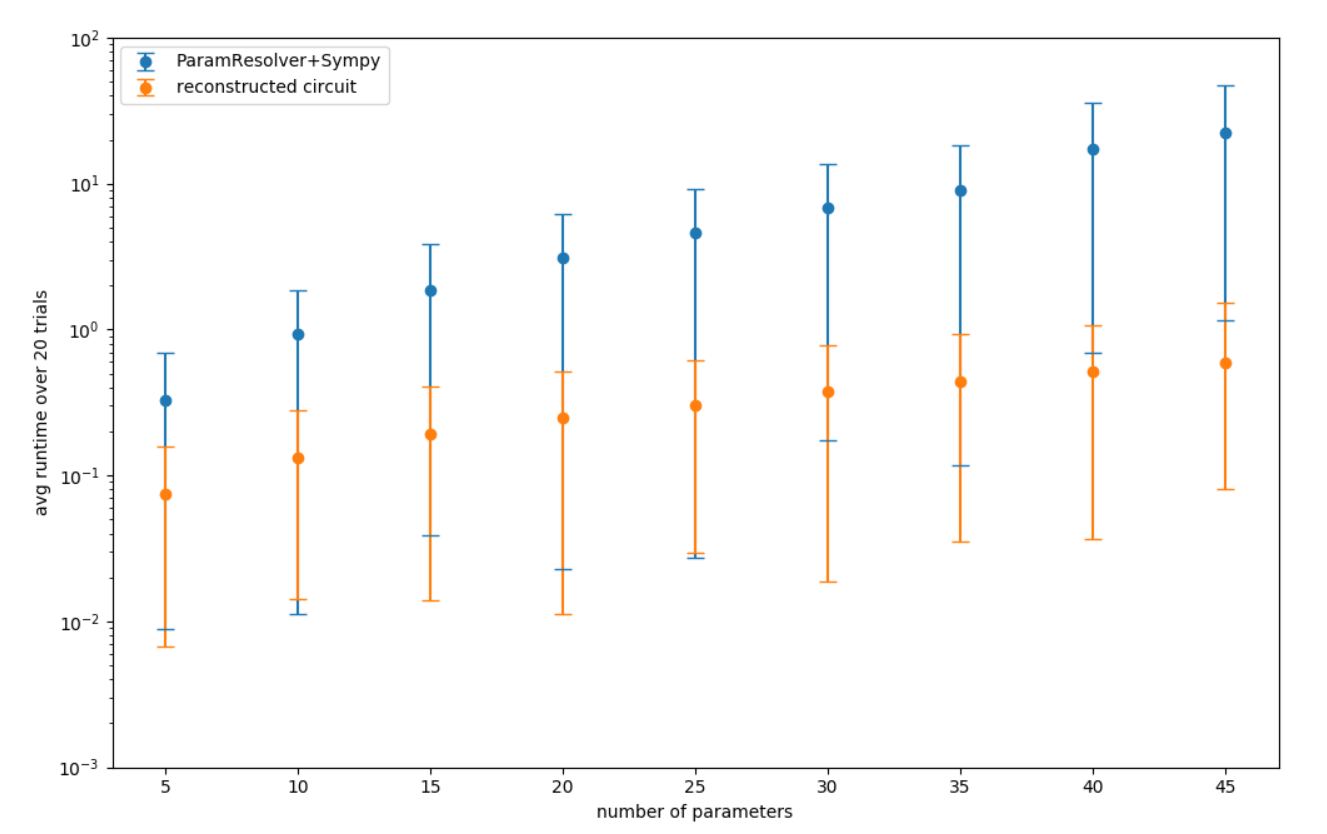Cirq: ParamResolver is slow
Reconstructing a circuit op-wise and replacing all parametrized ops with new ops containing parameter updates is 10-50x faster than using cirq.ParamResolver with sympy symbols…
Example code to reproduce:
from timeit import default_timer as timer
import numpy as np
import sympy
import cirq
def update_params(circuit, params):
"""Competitor method to cirq.ParamResolver."""
new_op_tree = []
for op, param in zip(circuit.all_operations(), params):
new_op_tree.append(op.gate._with_exponent(param/np.pi)(*op.qubits))
return cirq.Circuit.from_ops(new_op_tree)
trials = 100
for depth in [10, 15, 20]:
sympy_circuit = cirq.Circuit.from_ops([cirq.Rx(sympy.Symbol(str(k)))(cirq.LineQubit(0)) for k in range(depth)])
random_params = np.random.randn(trials, depth)
# time twenty runs
start = timer()
for j in range(trials):
resolver = dict(zip([str(k) for k in range(depth)], random_params[j]))
wf1 = cirq.Simulator().simulate(sympy_circuit, param_resolver=resolver).final_state
end = timer() - start
print(f"{depth} parameters, {trials} trials using Sympy+ParamResolver: {end} seconds")
start = timer()
for j in range(trials):
float_circuit = update_params(sympy_circuit, random_params[j])
wf2 = cirq.Simulator().simulate(float_circuit).final_state
end = timer() - start
print(f"{depth} parameters, {trials} trials using reconstructed circuit: {end} seconds")
produced (cirq v0.5.0, Windows 10 + core i7 gen 7 processor)
>>> 10 parameters, 100 trials using Sympy+ParamResolver: 2.408036000095308 seconds
>>> 10 parameters, 100 trials using reconstructed circuit: 0.1671589999459684 seconds
>>> 15 parameters, 100 trials using Sympy+ParamResolver: 4.347879000008106 seconds
>>> 15 parameters, 100 trials using reconstructed circuit: 0.25207799999043345 seconds
>>> 20 parameters, 100 trials using Sympy+ParamResolver: 7.1194350000005215 seconds
>>> 20 parameters, 100 trials using reconstructed circuit: 0.31734399998094887 seconds
Some plots of how this scales with large numbers of parameters (generated from a different script using the same update_params method):

About this issue
- Original URL
- State: closed
- Created 5 years ago
- Reactions: 1
- Comments: 17 (1 by maintainers)
Commits related to this issue
- Rewrite sympy in 20 lines (#3205) - sympy is soooooooooooo slow - Change parameter resolver to handle basic sympy cases - Speeds parameter resolution up by ~10x in common cases. Fixes #1899 — committed to quantumlib/Cirq by dstrain115 4 years ago
- Rewrite sympy in 20 lines (#3205) - sympy is soooooooooooo slow - Change parameter resolver to handle basic sympy cases - Speeds parameter resolution up by ~10x in common cases. Fixes #1899 — committed to tonybruguier/Cirq by dstrain115 4 years ago
I took a stab at short-circuiting sympy for common cases for PR #2394 . It does not help the above code as written, but, if flattened or if using XPowGate (which doesn’t add the “x/pi” formula), this speeds up the code significantly.
The changed code is below, for reference: